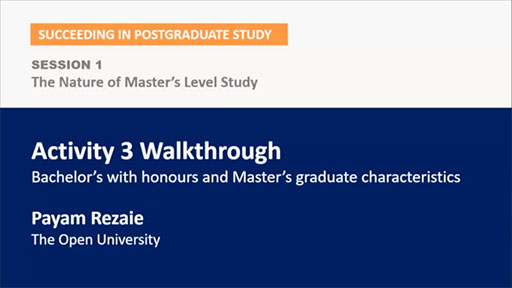5.1 Reflecting on Activity 3
Many of the skills and competencies learned as part of a first degree are further developed at postgraduate level, so overlap in some areas is to be expected. As you will probably have noted however, some qualitative differences are either further elaborated on or specific to Master’s graduates. Key skills and attributes are typically assessed through defined learning outcomes on courses, and you will be able to build on and monitor these further as you make progress with your studies. Take a few minutes now to view this presentation, before moving on to the next section.

Transcript: Session 1, slidecast 1: Activity 3 walkthrough
A sample conclusion is provided below, and is included here for reference. Do note that this illustrates one approach that could be taken – it is not meant to be a ‘definitive’ answer, but one that could be used as a basis for reflection. How does this compare with your own evaluation? Remember to retain a copy of your written conclusion, as you will refer to this again in Session 2.
Box 3 Example conclusion
Part 1
How do the skills and attributes expected from a Master’s graduate differ from those of a Bachelor’s with Honours graduate?
The key skills and core attributes for both Bachelor’s with Honours and Master’s graduates can be broadly categorised under three headings: ‘Knowledge, Understanding and its Application’, ‘Critical Skills’, and ‘Practical, Professional and Employability Skills’. There is some overlap between levels, but this is to be expected – it reflects the transition from undergraduate to postgraduate, where skills and attributes learned previously will continue to be engaged, developed further and assessed at a more advanced level. The expectation, therefore, is of a continuous rather than a disjointed or ‘clear-cut’ learning journey. However, in reviewing the information provided in the extracts, several key differences emerged for Master’s graduates:
- Independent learning ability (required for continuing professional development). A significantly greater emphasis appeared to be placed on the importance of independent learning ability, reflection and continued professional development for Master’s degree graduates. ‘Independent Learning Ability’ could constitute a separate (i.e. distinct) qualitative criterion for Master’s.
- Critical skills. Apart from independent learning ability, a prominent qualitative emphasis was placed on ‘contemporary’ critical skills (awareness and evaluation) expected from a Master’s graduate. This includes critical awareness of current issues, developments, and insights at (or informed by) the forefront of the academic discipline, field of study or professional area; the ability to critically evaluate current research, advanced scholarship, methodologies in the area, and where appropriate, to develop critiques and propose new hypotheses.
- Knowledge, understanding and its application. The emphasis on ‘specialist’ and ‘advanced’ knowledge and understanding was clear. Knowledge and understanding of a Master’s graduate should be informed by current practice, scholarship and research, and expected to be in-depth, advanced, and at the forefront of the field or discipline. Master’s graduates are also expected to be able to demonstrate originality in applying their knowledge, understand how the boundaries of knowledge are advanced through research, to have a comprehensive understanding of techniques applicable to their own research or advanced scholarship, as well as knowledge of professional responsibility, integrity and ethics.
- Practical, professional and employability skills. Those that stood out for Master’s graduates (compared with Bachelor’s with Honours graduates) emphasised the importance of acting autonomously in planning and implementing tasks at this level, being able to demonstrate self-direction and originality in tackling and solving problems, and to deal with complex issues systematically and creatively. These are high-level competency skills relevant to employment.
Part 2
Are there any skills or attributes that you would consider to be unique to Master’s?
The following attributes particularly stood out for Master’s (and are italicised for emphasis):
- knowledge of professional responsibility, integrity and ethics
- ability to demonstrate self-direction and originality in tackling and solving problems
- ability to deal with complex issues both systematically and creatively
- ability to reflect on own progress as a learner, to continue to advance own knowledge and understanding, and develop new skills to a high level.
Total word count: 448 words
[Conclusion 1: 382 words; Conclusion 2: 66 words]
